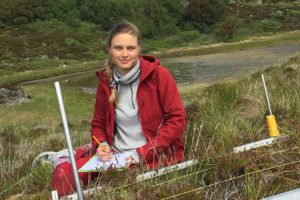 What is your background? Where are you from? What do you study? What are you most interested in, scientifically?
What is your background? Where are you from? What do you study? What are you most interested in, scientifically?
I am a master student at the University of Bergen in Norway studying ecology, evolution and biodiversity, but more specifically the effect of drought in heathlands. My interest is focused on climate change and its effect on the function of an ecosystem and I have an increasing interest for what the plant functional traits in an ecosystem can tell us about the status of the system.
What are your goals for the upcoming course in Peru? How will you know if you’ve met these goals?
Travelling to Peru and joining the PFTC5 course is something I am really looking forward to. My main goals would be to gain more field experience and learn some new skills for trait measurements. But I am also aiming to get to know everyone and learn from their experiences. Having two weeks with intensive work will hopefully make me more comfortable with practising what I have learned, and by then I will know if I have reached my goals.
What are you most excited about, with respect to the upcoming course and trip?
Experiencing a new environment, culture and new people is always very exciting, and I am really looking forward to gain all of these new experiences. I am also very excited about doing fieldwork somewhere I have never been before. Most of my experiences is from Norwegian heathlands or the rainforest in Australia.
What do you anticipate people will think about climate change in Peru? Do you think most people will accept that the planet is warming, and that this is largely being caused by human activities? Or will this topic be controversial?
Personally, I do not know what the general public in Peru think about climate change, but the general education level is quite low. The lack of education might influence peoples understanding of climate change. This could mean that most people will not acknowledge that the planet is warming and that it is cause by human activity. On the other hand, Peru is quite vulnerable with a high biodiversity that is already affected. If this effect the people in Peru, they might acknowledge that climate change is happening. It all comes down to education and/or if they are experiencing the changes themselves.
What do you know about public perceptions of climate change in your home country? What, if anything, have you experienced related to public perceptions of climate change?
In Norway most people believe in climate change and it is something the government is acknowledging, and they are working actively to reduce our emissions. Right now, it is mostly tax based, especially for flights. But there is some uproar in the media from people believing either that there is no climate change or that there is climate change, but which is not caused by humans. Luckily, this is not the majority of the Norwegian population, but it illustrates that even though you have a lot of compulsory schooling it does not necessarily mean that people believe in climate change.
Thanks, Kristine, for being a blog-pioneer! I look forward to working with you in Peru.